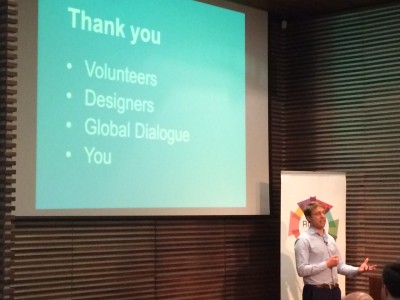Weekly Notes: legal news from ICLR – 24 April 2015
This week’s hoedown of legal news from home and abroad includes lawyers at the barricades, a prosecution service on the defensive, and a return to the planet of the apertures. Plus a set of Russian dolls and other victims of overseas injustice. Also worth reading: Custodians and gatekeepers: maintaining access to public legal information, by Paul
This week’s hoedown of legal news from home and abroad includes lawyers at the barricades, a prosecution service on the defensive, and a return to the planet of the apertures. Plus a set of Russian dolls and other victims of overseas injustice.
Also worth reading:
- Custodians and gatekeepers: maintaining access to public legal information, by Paul Magrath on Internet Newsletter for Lawyers
- Case Law On Trial: 1946 to 1970 (Find out which cases from this period have been getting the most votes for inclusion in our special Anniversary Edition.)
- What’s the difference between a “law report” and a “transcript”? User tips.
Animal Rights
Legal anthropomorphism is on the march. But let’s not make a snap judgment.
In a week that saw protesters march to Westminster in support of animal rights – which in the case of an octopus might include photographic copyright – a US court made legal history by recognising that a chimpanzee could be a legal person.

According to BuzzFeed News, a court has implicitly recognized two chimpanzees currently used for biomedical experiments as legal persons, forcing a university to defend keeping them in captivity.
Hercules and Leo, as they have been named by their human keepers, are currently used for biomedical experiments at Stony Brook University on Long Island. On 20 April 2015 Manhattan Supreme Court Justice Barbara Jaffe granted them a hearing on a habeas corpus petition brought on their behalf by the Nonhuman Rights Project. Stony Brook University must now provide the court with a legally sufficient reason for keeping Leo and Hercules in captivity or the chimps will be set free. The court has scheduled the hearing for May 6, according to NhRP.
Similar cases have been filed for two other chimpanzees — Tommy, who lives in a cage on a used trailer lot in Gloversville, New York, and Kiko, who is held on private property in Niagara Falls. In Tommy’s case the New York’s Court of Appeals on 4 December 2014 dismissed an appeal from a ruling by Justice J Sise on 18 December 2013 that he was not in law a person: see Weekly Notes – 15 December 2014.
For a somewhat dismissive view of the case, see: Above the Law No, A Judge Didn’t Say Chimpanzees Are People
Photographic fauna
Last year, a photograph taken by a black macaque, the so-called Simian Selfie, went viral, prompting the question whether the photographer who had set up the shoot, during which the monkey had grabbed the camera and taken the self portrait, could claim copyright (see Weekly Notes – 8 August 2014).
If not, it was assumed that there would be no copyright and the picture was in the public domain and could be distributed freely, as it was being done by WikiMedia. The issue raised its head again, and indeed appeared to grow arms or at any rate legs (eight of them) when an octopus started taking photographs of visitors to its aquarium using a specially constructed device attached to the window of its tank.
Rambo, as the female octopus is called by her keepers, is apparently an “absolute sucker” for underwater photography, after learning to snap pictures of guests using a waterproof digital camera mounted to the side of her tank at Kelly Tarlton’s Sea Life Aquarium in Auckland, New Zealand, according to Huffington Post (where you can also see a video, produced by Sony, who made the camera, of what they call the Octographer in action).
Rambo is not the world’s only octographer. Another one at Middlebury College in Vermont last month grabbed a camera left in its enclosure, and took a picture of the man who’d left it there, as reported in PetaPixel.
The New Zealand aquarium has been selling Rambo’s photos for NZ$2 apiece. The money is used to fund the aquarium itself. But who owns the copyright? No one seems to have discussed it online (send me a link if they have).
Votes for Animals
And so to this week’s march, which claimed ‘Votes for Animals”, in a bid to highlight animal welfare rather than (one assumes) any systematic extension of the franchise to the birds, bees and beasties. Brian May, astronomer, badger champion and former Queen guitarist, was in the vanguard of the march, which proceeded from Lush, a Body shop for the me-too generation, to the Houses of Westminster, many wearing the Edwardian garb reminiscent of the suffragettes of a hundred years ago. When they got there, according to The Times, May told the crowd:
“We need a different kind of society. There is no compassion for any other species apart from humans and very little for humans either. In the past few days, I have seen people calling other humans cockroaches.”
For cockroach, read katydid. (Well, she did, didn’t she?)
Legal revolution
Retired judges in appeal to masses
The animal rights activists weren’t the only ones marching on Westminster this week. Not for the first time in recent years, lawyers protested against legal aid cuts and the current government’s lack of support (or piecemeal demolition) of the justice system, as they saw it. Among those speaking at the Vote for Justice rally on 23 April on were retired Court of Appeal judges, Sir Alan Moses and Sir Anthony Hooper, who both spoke out critically. Sir Alan said
“No one seems to care about the plight of those who have neither the ability to protect themselves in a legal sense and cannot afford a lawyer.
“That [people] are deprived of the chance of legal aid seems to figure at the very bottom of concern in this election.
“No one thinks they are ever going to be faced with circumstances that require someone to hold their hand and safeguard them in the frightening and alienating circumstances of a court of law.
“Who cares about the prisoner whose rights are abused and needs legal advice and assistance? Who cares about the immigrant who asserts they are a genuine refugee? Those who cannot afford access to the courts are often the unpopular minorities and there are no votes in helping them.”
Sir Anthony was widely reported as using the phrase, “it’s revolution time”. What The Guardian reported him saying, more fully, was this:
“I’m completely depressed,” he said. “I started out in the legal profession 30-odd years ago when we had as Rolls-Royce a system as you possibly could have. This has been destroyed gradually and then quickly over the past few years. Whatever we have said it’s not made any difference at all.
“If the Conservatives come back into power, it’s revolution time. We have to stop helping them and stop working.
“The Bar Council are not going to do anything. The Law Society is not going to do anything. The judges are not going to do anything. Unless you [lawyers] are prepared to withdraw your labour you have no hope. If the Tories get back in, they haven’t even started on us.”
The rally was organised by practitioner groups the Criminal Law Solicitors’ Association (CLSA) and London Criminal Courts Solicitors’ Association.
Full report: The Guardian
The Daily Telegraph decided to concentrate on a different aspect of the legal system: how much money lawyers can make if, instead of doing legal aid, they go into well paid commercial work. Law graduates could ‘expect to earn £54,000 when they walk into their first job and most will see their pay rise by a staggering £25,000 every five years’, according to the report, entitled How a lawyer’s salary surges once it reaches £100,000.
Janner in the works
Storm of controversy over CPS decision not to prosecute senile politician over sex abuse
The decision of Alison Saunders, the Director of Public Prosecutions, that Greville Janner, the elderly barrister and Labour peer, would not now be prosecuted for historic sex offences, by reason of his mental incapacity to plead, has raised a storm of protest from those who think the Crown Prosecution Service should nevertheless proceed, if only to give the alleged victims their day in court, and perhaps also to atone for previous failures of the CPS to go after Janner when they had the chance.
But there has been an equally vehement chorus of support for Saunders and the CPS, from criminal specialists who point out that any ensuing trial could not possibly be fair, given the apparently well-attested current mental condition of the elderly Lord Janner.
Those in the critical camp include:
- Former director of public prosecutions Ken Macdonald QC, who said the decision should have been taken by a judge: see Guardian, Lord Janner child abuse claims: ‘trial was decision for court’
- Linda Lee, former Law Society president, as reported in the Gazette
- A group of MPs and parliamentary candidates, led by Simon Danczuk, in a letter to The Times.
- The NSPCC’s chief executive, Peter Wanless, in a letter to Saunders, reported in The Independent
- Various other people whose views are summarised by Brooke Perriam, on The Justice Gap, in: DPP’s decision not to charge Janner slammed ‘wholly perverse’
Among those supporting the Director’s decision are:
- Dan Bunting, criminal barrister, on The Justice Gap (reproduced from his own A Life in the Bus Lane blog): The CPS decision on Janner might please no-one, but it happens to be right
- Joshua Rozenberg, in The Guardian: Critics of Lord Janner decision misunderstand justice system
- David Allen, criminal barrister, on The UK Criminal Law blog
- Anna Raccoon, on her trenchantly eccentric blog: Janner’s Janissaries.
Hauled before the Beak
As if this were not enough for the CPS to cope with, it is now being hauled before Bexley Magistrates’ Court to answer the charge that it failed to pay wasted costs order of £3,600 made against the CPS last September, to be paid by 20 October 2014. The charge arose out of a failed drink-drive prosecution, but a CPS spokesperson said the reason it hadn’t been paid was because they were still waiting for the bank details of the person to whom it was payable.
Full story: Law Society Gazette
The Only Way Is Graphix
 Human rights, beautifully presented in new site
Human rights, beautifully presented in new site
Adam Wagner, founding editor of the UK Human Rights Blog, has gone one better with the launch, at the Free Word centre on 21 April, of Rights Info, a website which offers a new and intensely visual approach to public education about human rights. He has worked closely with Information is Beautiful Studios and a bunch of volunteers, to create something that seems to belong more in the Science Museum or Wellcome Foundation than in the dry stone corridors of the law.

All the information is presented either as infographics, or communicated alongside carefully chosen images in simple bite-sized chunks, designed to be read not by lawyers but by ordinary people, even those with little learning or capacity for learning, yet without any loss of fidelity or, more importantly, accuracy.
To achieve this, Adam’s team worked with, among others, an advertising copywriter and a tabloid journalist. The aim was to write in clear plain English, more like Buzzfeed than a legal blog. It was, he said, another way of bringing people into the debate.
I particularly liked the “short stories” which paraphrase a complex case in simple linear narrative in no more than 300 words. (Perhaps a pointer towards more readable headnotes in law reports?)
My favourite of the infographics is “14 Worst Human Rights Myths”. This takes a notorious case such as “A man was allowed to stay in the UK because he had a pet cat”, and presents the “myth” alongside “what really happened”. Best of all, there are then links under the myth to the original article in, say, the Daily Mail, or in this case, via Politics.co.uk, to Theresa May’s infamous 2011 Party Conference speech; and then, on the other side, to the “good” report in The Guardian or, best of all, to the original judgment.
Dates and deadlines
Lasok Law Lecture 2015 – Exeter University
This year’s lecture will be delivered by Professor Norbert Reich on the subject of “EU Citizenship – Progressive Concept or Regressive Failure?”
Time and place: 27 April, 17:00 – 18:00 at Newman Blue LT, Peter Chalk building, Streatham Campus, University of Exeter, Exeter
Details: event listing
Law (and injustice) from around the world
Bangladesh
Garment factories: report on safety improvement
Readers may recall the collapse of a garment factory in Dhaka, two years ago, in April 2013, with the loss of over a thousand lives and double that number injured. Human Rights Watch examines the huge efforts made since then to improve safety for the workers in these places, and wonders whether they go far enough. See the report and recommendations: Whoever Raises their Head Suffers the Most
Eritrea
Routine miscarriages of justice
In a guest post on the Fair Trials blog, Biniam F. Ghebremichael from Human Rights Concern – Eritrea, explains how the provisions of law established in Eritrea’s Transitional Criminal Procedure Code are in practice violated directly and systematically by the executive and judicial branches of the government.
Ethiopia
Bloggers detained
A year ago six bloggers, who belong to the Zone 9 blogging collective, and three journalists were arrested in a coordinated sweep in Ethiopia’s capital, Addis Ababa. They were charged under the criminal code and anti-terrorism law for having links to banned opposition groups and trying to violently overthrow the government. The evidence against them includes documentation related to digital security and various media articles related to their online campaigns on freedom of expression, freedom of assembly, and respect for the Ethiopian constitution.
Since then their trial has been adjourned, and thereby unnecessarily delayed, some 27 times, reported Human Rights Watch, whose deputy Africa director, Leslie Lefkow comments:
The stop-start Zone 9 trial underscores concerns that this is a spurious prosecution before a court under the government’s thumb. The authorities should drop the charges and release these young Ethiopians, so they can contribute to the political debate rather than to the prison population.
Russia
Twerking girls jailed
A court in Novorossiysk has jailed three women for performing a twerking dance in front of a World War Two memorial, according to the BBC, after finding that their “erotic and sexual twerk dance” (which was posted on YouTube) was “disrespectful to historic memory and unacceptable”.
It would be nice to know what actual law they broke; but you sort of wonder whether, in a Russian court, that makes much difference. Even Russia Today, in reporting the story, merely alluded to “charges of hooliganism”, which is not very specific. Perhaps more revealing is the statement explaining the decision not to imprison the only under-16 member of the troupe, but instead to reprimand her mother for failing to
“carry out measures to ensure the proper physical, intellectual, psychological, spiritual and moral development of the child”.
RT did betray a measure of irony when remarking:
Parallels have also been drawn in the media with the Soviet era, when the authorities disapproved of boogie-woogie, the foxtrot and other “ideologically alien” dances.
But it did show some stills from the incriminating video, which depict the war memorial in all its clumsy brutalism, recalling to mind nothing so much as that post-apocalyptic scene in Planet of the Apes (there we go again).
Turkey
What’s not to like? A sentence no journalist needs.
Yaşar Elma, a journalist from a local daily in southeastern Turkey has received a suspended prison sentence for “liking” a remark criticising President Recep Tayyip Erdoğan on Facebook, which the the 19th Criminal Court of First Instance in the Gaziantep province deemed an “insult”, according to a report in Hurriyet Daily News.
“I had just used the ‘like’ feature of Facebook when I saw a comment on Mr. President one day. I deleted it after half an hour, but the police came up and the court convicted me in the second hearing of the trial,” Elma said in an interview to the Doğan News Agency, noting that he “did not know that liking a comment was a crime.”
That’s it for now. Enjoy the week ahead, and don’t forget to vote in our 150 Years of Case Law on Trial poll, currently in its third period, from 1946 to 1970.
This post was written by Paul Magrath, Head of Product Development and Online Content at ICLR. It does not necessarily represent any views of ICLR as an organisation.
